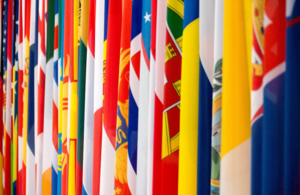Assistant Secretary-General and Deputy Executive Director of UN Women: UK response
Ms. Nicola Murray, Deputy Head of the UK Delegation to the OSCE, responds to Ms Regnér from UN Women and highlights UK efforts to advance gender equality.

OSCE
Thank you Madam Chair
And thank you Ms Regnér for your excellent presentation today.
The UK highly values the work of UN Women, and its response to the COVID-19 crisis. Your policy briefs, data collection, analysis and evidence provide international organisations and national governments valuable information on where we need to do better and that can help us to implement and strengthen effective, gender responsive approaches to COVID-19 recovery plans.
Your presentation today is a stark reminder of the gendered impacts of COVID-19 – and how the pandemic has exacerbated many of the challenges that women and girls already faced. It highlights why it is essential that we not only step up our efforts to address gender inequalities and their root causes, but that we put gender equality at the centre of all that we do.
Empowering women and girls, and preventing violence against them, is a UK priority. We are committed to ensuring every girl receives at least 12 years of quality education, and to ending the preventable deaths of mothers, new-born babies and children by 2030. Supporting comprehensive sexual and reproductive health and rights is fundamental for gender equality: it ensures that all women and girls have control over their own lives and their bodies.
The UK has provided additional support to the UN Population Fund (UNFPA) to scale up reporting, protection and support services for women and girls affected by gender-based violence and to address reproductive health supply shortages caused by the pandemic. As a co-leader of the Action Coalition on Gender-Based Violence at the Generation Equality Forum, we will help to tackle the root causes of violence, including using education to stop violence before it starts. And at COP26, the UK Presidency will champion a green, inclusive and resilient recovery.
We know that women and girls not only experience inequality and discrimination because of their gender. This can be compounded by intersecting factors – such as age, disability, ethnicity, sexuality, religion or belief. So it is essential to build intersectional approaches into our processes, programmes, and policies to tackle the multiple and compounding layers of discrimination and oppression faced by women and girls.
Gender is, and must remain, a priority for the entire UN system, as well as for other multilateral organisations and for national governments.
At the OSCE, achieving gender equality is an integral part of the organisation’s concept of comprehensive security. We have a body of political commitments, agreed, by consensus, by all states – for example Ministerial Council Decision 10/11 on women in the economic sphere; 4/18 on preventing and combating violence against women, and 14/04 on the promotion of gender equality. It is the responsibility of every state to implement these commitments, to review critically our progress and to use the OSCE platform to share our experiences, lessons learned and best practice. As you said Ms Regnér, we need to walk the talk.
Thank you Chair